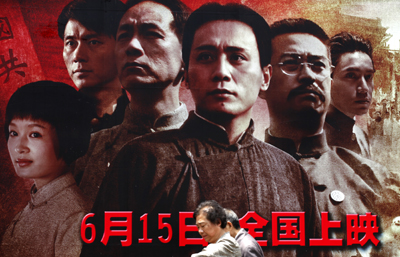The creators of “Beginning of the Great Revival,” a new film about the founding of the Chinese Communist Party, have spared no expense to make it a popular success. Done in a popular Chinese soap opera style, the movie features more than 100 stars, along with leading directors and producers. Then, the government enlisted information authorities to wipe out negative news coverage, according to international media reports.
The Central Propaganda Department ordered media outlets not to publish negative reviews of the film, the U.S.-based China Digital Times reported. The movie review site douban and theater ticketing site Mtime disabled online ratings and reviews for the film after the majority posted were negative, according to PC World. Ratings of the film’s 2009 companion, “The Founding of a Republic,” remained visible on the sites, although averaging only around 6 out of 10.
International news reports said Chinese regulators had even delayed the release of other crowd-pleasers, including the latest installments of Hollywood franchises “Harry Potter” and “Transformers,” in a bid to drive moviegoers to “Revival.” (Still more manipulation has been suggested. Recent movie-goers attending other films were issued tickets for “Revival” in an effort to artificially boost its box office figures, China Digital Times and others reported.)
So what is the movie itself like? When I saw it in Manhattan last week the only way I could follow the barrage of characters was by reading their printed names, which constantly appeared on screen. “Revival” races through the official historical narrative. I love Chinese soaps, but this departure from the genre’s slow pacing distracted from the saccharine pleasures of Mao’s romance with his hometown sweetheart Yang Kaihui, or the CCP heroes’ defense of its inaugural congress from a gang of thugs. The theater was nearly empty. The audience gasped with pleasure during the trailer for “Snow Flower and the Secret Fan“, another film about historical China focusing on a friendship between two women. In comparison, “Revival’s” overcomplicated plot failed to elicit an emotional response.
For the Communist Party, the film may be delivering an unanticipated message. The film lauds a popular uprising, even as contemporary party leaders systematically censor pro-democracy messages. Many online commentators said they were inspired by the movie’s depiction of the overthrow of the Guomindang’s one-party regime—drawing a parallel with the current leaders, according to Global Voices Online.
Ironically, in one of “Revival’s” most stirring moments, actor Liu Ye in the role of Communist leader Mao Zedong passionately protests the 1919 shutdown of a Hunan newspaper. The closure was intended to obstruct reporting of Hunan warlord Zhang Jingyao’s atrocities against people in Mao’s hometown, according to historian Edward McCord. Through its own propaganda, the party is unwittingly highlighting its oppressive media restrictions.
